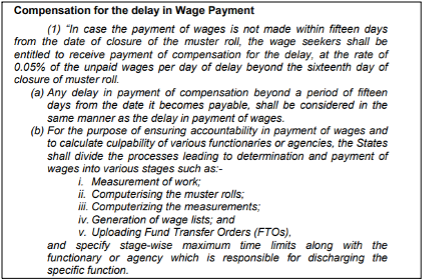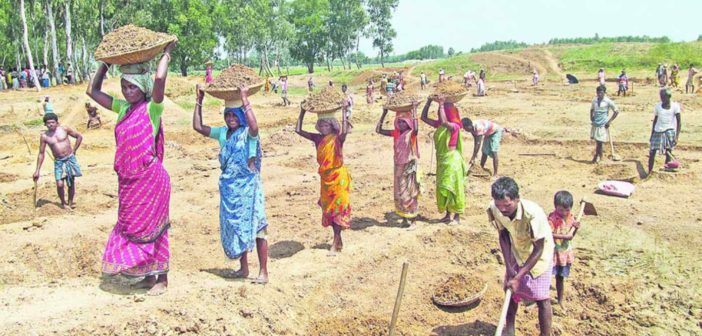The Parliamentary Standing committee on Rural Development and Panchayati Raj recently submitted its evaluation report of the Mahatma Gandhi National Rural Employment Guarantee Act (MGNREGA). Among other things, the committee highlighted the need to make pragmatic budgetary allocation for the scheme, ensure seamless flow of funds throughout the year, inclusion of multiple other works under the scheme.
The Mahatma Gandhi National Rural Employment Guarantee Act, 2005, also popularly known as MGNREGA, is a social security scheme implemented by the Ministry of Rural Development together with state governments. The legislation guarantees 100 days of wage employment in a financial year, to adult members in a rural household who are willing to do unskilled manual work at a fixed minimum wage. The objectives of the scheme include:
- Providing not less than one hundred days of unskilled manual work as guaranteed employment in a financial year to every household in rural areas as per demand, resulting in the creation of productive assets of prescribed quality and durability.
- Strengthening the livelihood resource base of the poor
- Proactively ensuring social inclusion
After about 16 years of the implementation of the act, a parliamentary standing committee on rural development and Panchayati Raj recently tabled the report, ‘Critical Evaluation of Mahatma Gandhi National Rural Employment Guarantee Act (MGNREGA)’ in the Lok Sabha. In the report, the Committee assessed and highlighted the shortcomings in the implementation of the flagship scheme and made a slew of recommendations to be incorporated to improve the outcomes of the scheme.
Despite increase in demand, government budget allocation continues to be low for MGNREGA
Analysing the budget estimates (BE), revised estimates (RE), and actual funds released for the scheme since its inception, the committee noted that there was an increase in demand for the scheme drawing out of the constantly rising budgetary demand. However, since 2015-16, there was a substantial hike at the RE stage, which further elevated the budgetary allocation of the scheme. For instance, in 2018-19, the BE was Rs. 55,000 crores were increased to Rs. 61,830 crores at the RE stage. Similarly, in 2019-20, the BE was 60,000 crores which were revised to Rs. 71,002 crores during the RE. In 2020-21, the RE was Rs. 1,11,500 crores, up from Rs. 61,500 crores at the BE stage. For 2021-22, as of 01 September 2021, only six months into 2021-22, Rs. 52,228.84 crore of the allocated BE of Rs. 73,000 crores were already spent.
In 2020-21, the demand for work under MGNREGA had witnessed an unprecedented surge following the reverse migration due to the pandemic. A total of 389.1 crore person days were generated and 7.55 crore households (11.19 crore individuals) availed of the scheme in 2020-21. Making note of the lower allocation for the scheme despite a rise in demand, the committee stated that the budgetary allocation of such an enormous scheme should be done in a more pragmatic manner taking into consideration the expenditure of previous years. The committee also said that ‘agreed to labour budget’ must be available at the concerned level so that there is no dearth of funds in mid-year and flow of funds for payment of wages, material share, etc. is maintained seamlessly. However, in the Union Budget for 2022-23, the Government has retained the allocation at Rs. 73,000 crores despite the previous year’s revised estimates being 25% higher at Rs. 98,000 crores.
Centre was asked to work with State Governments to ensure provisions of the Act are adhered to
The Department of Rural Development cited the non-completion of requisite procedural formalities by the State governments in the stipulated time, such as non-updation of muster rolls, delay in submission of documents for releasing wages, material share by the States along-with delay in the release of states’ share of 25% material costs, as some of the hindrances for the seamless flow of funds. Calling out the Department for highlighting only the State governments’ issues, the committee stated that instead of pointing fingers at each other, the governments should work together for the upliftment of the quality of lives of the rural population. The Department was also asked to take measures to force the state governments to stick to the statutory provisions to ensure that the beneficiaries are not kept waiting.
Allocated funds should be utilized in time-bound manner
The unspent balance during 2018-19 was Rs. 2,599 crores which increased to Rs. 5,271 crores in 2020-21. As of 5 November 2021, the unspent funds stood at Rs. 1,351 crores. Citing this, the committee noted “improvement” in the reduction of unspent funds by the Department. The committee recommended that “this downward trend in the accrual of unspent balances need to be maintained through rational measures and asked the Department of Rural Development to ensure that the unspent balances are completely mitigated by the utilization of allocated funds in a time-bound and financially prudent manner”.
As of 05 November 2021, the wage liability was Rs. 2,763.78 crores including Rs. 339.2 crores for SCs and Rs. 330.54 crores for STs. Stating its disappointment over the ‘state of affairs’ of the scheme, the committee stated that there was no reason for justifying this pendency and asked the Department to wipe off the liabilities as soon as possible.
Allowance for unemployment, compensation for delay in wage payment are not being paid
The committee also noted that despite legal provision which entitles wage seekers for compensation for delay in receiving wages, only about Rs.11.78 crores was paid as compensation between 2018-19 and 2020-21. This could be because the amount of delay in payment of wages is low or that the provision of delay compensation is not being implemented strictly on the ground level. It noted that the provision of the act for delay compensation was not being complied within most parts of the country and called for immediate action to ensure compliance.

The Act also provides for an unemployment allowance to those applicants who are not provided employment within 15 days. Despite the legal mandate, only Rs. 12,000 in 2019-20, and Rs. 3,000 in 2020-21 was paid under this head. Though it pulled up the state governments for not abiding by the provisions of law, it also held the nodal agency (Department of Rural Development) responsible for this and called for the implementation of the mandate in true ‘letter and spirit’ on the ground level.

Wages should be made uniform across the country and linked with inflationary index
To keep up with the rise of inflation having an effect on the price rise of even essential commodities, the committee suggested linking wages under the scheme to a commensurate inflationary index. The nominal wage under the scheme would not be sufficient otherwise, and so the rural masses will be forced to migrate to urban areas for better remuneration, against the objective of the scheme. It noted that the wage rates across most states were between Rs. 200 to Rs. 300 in 2021-22. The daily wage ranged from Rs. 193 in Chhattisgarh and Madhya Pradesh and Rs. 198 in Bihar and Jharkhand to Rs. 318 in 3 Gram Panchayats of Sikkim and Rs. 315 in Haryana. Noting the disparity of wages across states, the committee also asked the Department to fix a single unified wage rate at the beginning of every financial year.
Guaranteed workdays should be increased to 150 from 100
The Committee also strongly recommended an increase in the number of guaranteed days of work per household from 100 to 150 and further diversifying the nature of works under MGNREGA to meet 150 days of work. It stated that it was high time that the scheme is revamped, especially considering the changing times and emerging challenges arising out of the pandemic situation. However, as per the data provided in the report, the average days of employment provided per household ranged between only 48 to 52 days between 2018-19 and 2020-21.
Inclusion of agricultural works and agricultural labourers under the permissible domain of MGNREGA such as sowing, fencing, cutting of weeds, etc. was recommended by the committee. Rejuvenation of traditional water bodies, plantation of cash crops on the roadside and government lands, and lining of ponds with plastic to deal with water scarcity were suggested by the committee to be taken up under MGNREGA.
The Act provides 40% of the funds for material components, skilled and semi-skilled labour, and the remaining 60% for wages of unskilled labourers. Nonetheless, since the inception of the scheme, the nature of work and practices under the scheme has changed substantially with time because of the intervention of technology and called for the revision of the 60:40 wage-material ratio.
Other measures suggested by the committee
Apart from these, the committee also made the following recommendations.
- Increase in real-time monitoring of the scheme through the use of technology for wage transfer, verification of job cards, etc.
- Giving free basic medical facilities to all job cardholders
- Value addition and skilling of labourers in different aspects to improve their professional opportunities
- Create a better workplace for women and promote women-centric works. The participation rate of women has always been above 53% since 2015-16 though the Act mandates the provision of a minimum 33% of the work to women labourers.
- Increase the involvement of MPs through the issuance of directives to state governments and local bodies



